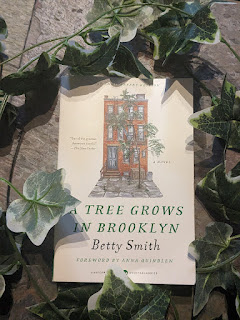Book Talk | A Tree Grows in Brooklyn
Hey Everyone and Happy New Year! I'm back with another book that caught my attention at Barnes & Nobles and they were having a sale, so I thought, why not? What I ended up picking up was a story about going through the motions of establishing generational wealth and just establishing yourself in a new country and how each generation keeps walking up the ladder. Where does the ladder end? No clue. Here are my thoughts on A Tree Grows in Brooklyn by Betty Smith.
About the Author
Betty Smith's A Tree Grows in Brooklyn is a poignant and moving tale filled with compassion and cruelty, laughter and heartache, crowded with life and people and incident. The story of young, sensitive, and idealistic Francie Nolan and her bittersweet formative years in the slums of Williamsburg has enchanted and inspired millions of readers for more than sixty years. By turns overwhelming, sublime, heartbreaking, and uplifting, the daily experiences of the unforgettable Nolans are raw with honesty and tenderly threaded with family connectedness -- in a work of literary art that brilliantly captures a unique time and place as well as incredibly rich moments of universal experience.
My Thoughts
When girls are young, they often daydream about boys, girls, animals, a fantasy world, the future. Our main character dreams of none of that, well except maybe the future. Our main character, Francis, is a young Irish girl growing up in the middle of 1900's Brooklyn to a mother that was too young to know how to love her and a father that was too naive to know how to love anyone but himself. She is also second generation Irish, lighting up a fire under her to dig her roots a little deeper than her parents or her grandparents ever did. Thus, Francis finds herself daydreaming about her drunken father, her possibly future, and sometimes, when the house is cold and the food is scarce, her mind wanders off into nothingness. Our author does a tremendous job, probably because she has been through these events herself, of portraying what it was like for a young, poor girl trying to find the American dream in a world that was less than dreamlike for her.
As the reader is going through the story, we are put into these interesting tidbits of everyday life in the 1900's - 1910's and are able to grasp what life was like back then. As always, it's astonishing what you could get away with for a penny and also what you could get away with in general, such as child labor. For someone who has never dived into this time period, this book does a great deal to paint the whole picture for you without seeming overbearing.
I feel that this story also dives into the generational wealth aspect and generational things all-together. Francie lived in no such luxury, so as a young child, that's all that she could see for herself. She never mentioned dreaming of what the future could hold, because everyday was a day of survival. It wasn't until she was older in her teens that she started wanting something a little more for herself and her family. No matter how harsh her family may have been at times, she never could see herself without them, because it is the unit she has always known.
I've talked a lot about Francis, but our other characters are just as intriguing. We have Francie's aunt, Sissy, who seems to go from husband to husband, which seemed a little weird to me considering the time period. She's a complex side character that strives to be a mother, even though all her attempts fail because the system has failed her (which is something we find out at the end). We also have Francis' brother, Neeley, who the whole time you feel like is going to go down the wrong path, but because he too has felt starvation and the stress of the winter winds, he also strives move his branch, just in a different way than Francie. And then we have Francis' mother, Katy, who doesn't even come close to being a perfect mother, but in the end, she was a mother who was just trying to survive and keep her kids alive to the next day.
Towards the end of the story, we start to see how Francis started to stop living for survival, but for more meaning and that was a beautiful way to end this beautifully, tragic, but wonderful story.
Until next time, Happy Reading!




Comments
Post a Comment